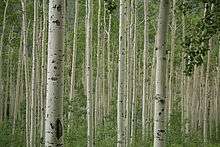aspen
See also: Aspen
English

Aspen trees
Pronunciation
- IPA(key): /ˈæspən/
Etymology 1
From Middle English aspen, corresponding to asp + -en.
Adjective
Etymology 2
From Middle English aspen, from Old English æspan (combining form), from Old English æspe (“aspen”). More at asp.
Noun
aspen (plural aspens)
- The asp tree; a kind of poplar tree (genus Populus sect. Populus). A medium-size tree with thin, straight trunks of a greenish-white color.
- Above a certain elevation, the aspens gave way to scrubby, gnarled pines.
- 1912, Zane Grey, Riders of the Purple Sage, Chapter 8
- Instead there were the white of aspens, streaks of branch and slender trunk glistening from the green of leaves […] .
- (uncountable) The wood of such a tree; usually pale, lightweight and soft.
- She claimed that aspen was the only "proper" material from which make a wicker basket.
Hyponyms
Translations
tree of genus Populus sect. Populus
|
|
Middle English
Etymology
From aspe (from Old English æspe) + -en.
Descendants
- English: aspen
References
- “aspe, (n.)” in MED Online, Ann Arbor, Mich.: University of Michigan, 2007, retrieved 2 May 2018.
Spanish
Swedish
This article is issued from
Wiktionary.
The text is licensed under Creative
Commons - Attribution - Sharealike.
Additional terms may apply for the media files.